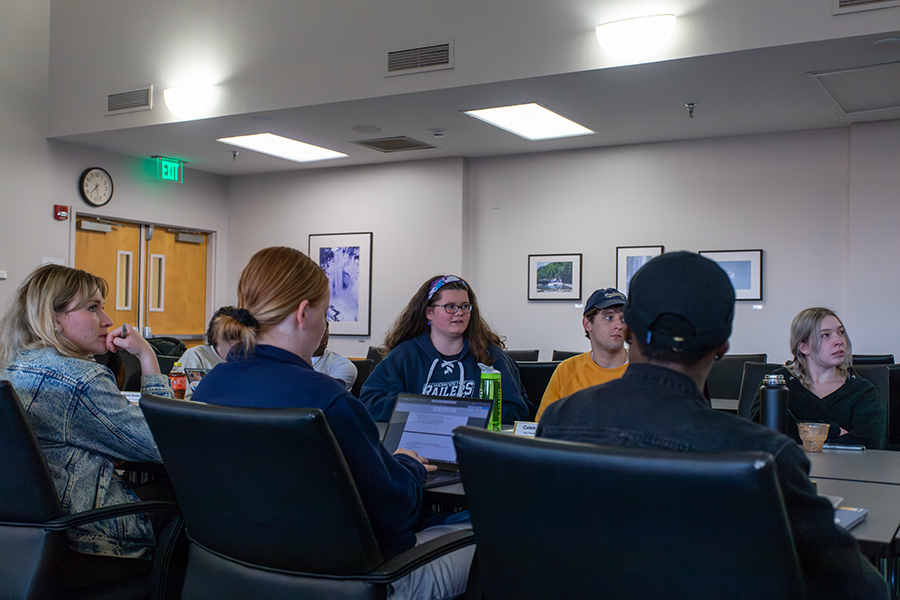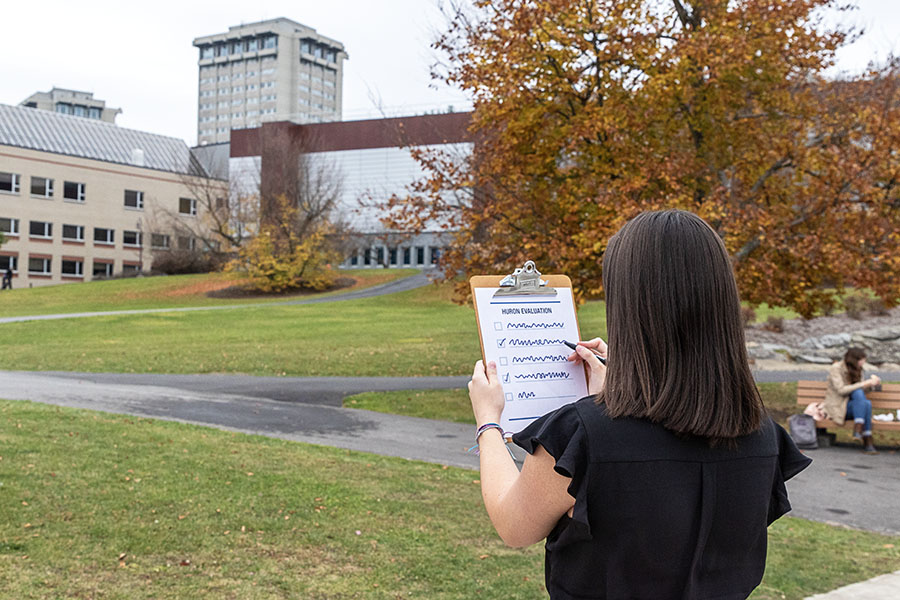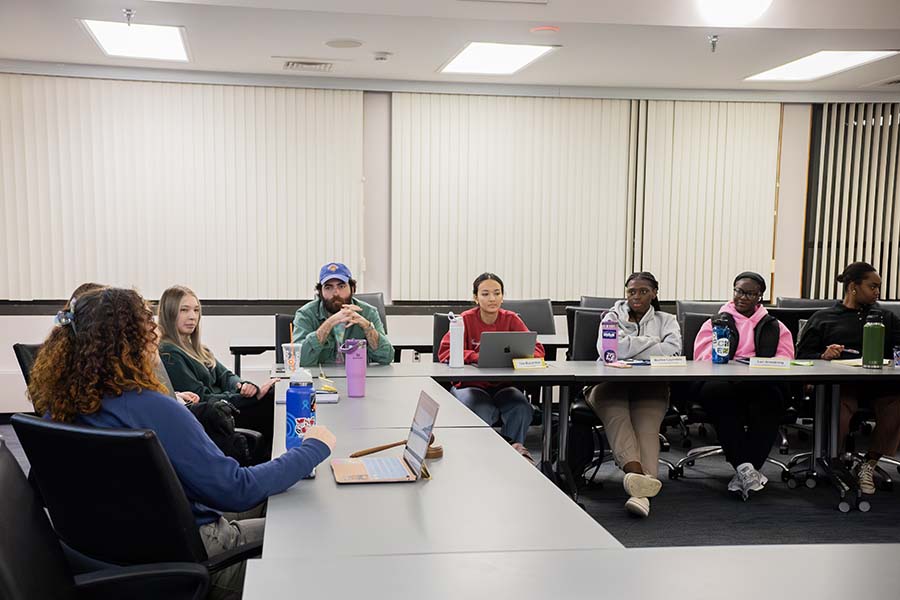The Ithaca College Student Governance Council met April 22 to hear from first-generation senator LaRon Pigford about a bill he introduced regarding how SGC can assist first-year and transfer students during orientation. The council also met with Jennifer Metzgar, director of Student Health Services, to discuss introducing the new role of health insurance navigator at the Hammond Health Center.
Pigford began his presentation by explaining his bill titled “Fostering an Alliance between SGC and New Student & Transition Programs (NSTP) to Assist First-Year and Transfer Students.” The purpose of the bill is to add to the current orientation programming, which focuses on helping first-year and transfer students socially acclimate to the college. Additionally, the bill aims to provide orientation programming with a distinct student perspective and assist incoming students in getting academically acclimated.
The bill outlines the importance of the council being directly involved with orientation planning, including understanding how orientation impacts first-year and transfer students who identify as first-gen or BIPOC, students who have a disability or are a part of a social group that is underrepresented at the college. The bill recognizes that orientation is a necessary and important part of a student’s transition into school, ensuring a smooth transition for incoming students and that students are aware of student organizations, clubs, sports and other on-campus resources available for students to join.
Pigford said he introduced the bill because, as a transfer student, he felt that his orientation experience could have been improved.
“I know my orientation experience as a transfer student was not that good,” Pigford said. “I’m going to be completely honest. There’s a lot of feedback from the student community as a whole about orientation not being the best here.”
Pigford’s bill suggests a temporary committee under SGC that will incorporate current student opinions on orientation with a focus on getting feedback from underrepresented student populations. The bill requires the vice president of academic affairs, the transfer senator, the international senator, the first-generation senator and two first-year class senators to serve on the committee.
Sophomore Rishabh Sen, vice president of campus affairs, asked Pigford to elaborate on why the vice president of academic affairs was required to join the committee.
Pigford said specific populations within first-year and transfer students need a more holistic approach to the assistance they receive during orientation and that the vice president of academic affairs will be able to provide an aspect of orientation programming that is missing.
“When we’re talking about a specialized population within first-year and transfer students we have to recognize … they don’t have enough resources [provided during] orientation to make sure that they are having a successful semester academically,” Pigford said. “[The] unique perspective that the vice president of academic affairs can have on the committee in coming up with new ways and initiatives for them to create more academic resources is amazing.”
With the bill being temporary, sophomore Nikki Sutera, senate chair, asked whether the bill would become permanent and added to the constitution. Pigford said he believed the committee should stay temporary and when its purpose is fulfilled, the committee should dissolve.
“[With] this bill, we’re not going to see change tomorrow, we will not want to see change next week,” Pigford said. “The earliest that I can see the committee meeting and creating ideas on how to make orientations better is for next year.”
After further discussing the bill with the council, amendments were made to make the language used in the bill more specific and clarify the position the vice president of academic affairs holds.
Junior Kathi Hodel, senator-at-large, made a motion to table the bill for the council’s next meeting. The motion was passed with 10 in favor, one abstaining and zero opposed. Pigford abstained since he proposed the bill.
Metzgar then presented medical and health resources provided by Student Health Services to the campus community. These resources include access to contraceptives, testing for sexually transmitted infections or diseases and transportation assistance for students needing to attend medical appointments or experiencing medical emergencies.
Metzgar also spoke about a new role that Student Health Services will be introducing — health insurance navigator. Metzgar said the new role will explain the financial aspects of having the college’s health insurance and answer any questions students have about their health insurance.
Sophomore Ty Anderson, vice president of residential affairs, asked about the process for students to connect with the navigator.
Metzgar said that since this position is new and has only recently been filled, they are planning for students to be able to call and schedule an appointment with the navigator, but they haven’t planned a way to schedule time online.
Sophomore Caleb Cackowski, vice president of communications, asked if Student Financial Services was going to communicate on a larger scale to the campus community about the new position.
Metzgar said she is still trying to find out the most effective way to communicate with the student body.
“We just did an article with The Ithacan on the health insurance navigator position,” Metzgar said. “We developed our own Instagram. I’ve been advertising on the LCD screens. I’d love to hear from you [on] what’s the most effective way. How do I reach students?”
Cackowski said a good way to reach students was to make sure that students know these resources are available to them during orientation including the new health insurance navigator role.Senior Carli McConnell, president of the student body, reminded the council in an open agenda that platform presentations are happening April 23 and that if any current members of the senate or executive board are running for a position to come to the Taughannock Falls room at 5 p.m.
The SGC is the sole representative body for the Ithaca College student community. The SGC can be contacted at [email protected].

















LaRon Pigford-Fomby • May 3, 2024 at 11:24 am
I am going to reiterate and clarify my presentation at the SGC meeting on April 22nd, for “2324-0004 – Fostering an Alliance between SGC and NSTP to Assist First-Year and Transfer Students,” and provide more context for the benefit of The Ithacan readers.
To be clear, I did not disparage the NSTP office or the hard work that goes into the Fall and Spring orientations each year, by making any statements or remarks about orientation. The direct quote that “my orientation experience as a transfer student was not that good”, is misleading. While my experience was delayed, due to my excused absence from the spring orientation, my orientation meeting with the Director of NSTP was effective. The purpose of the bill is to enhance orientation rather than ‘fix’ it by encouraging SGC and NSTP to work together and by adding to the existing student input that NSTP gets regarding orientation. In fact, I covered the following topics during the meetings on April 22nd and the 29th, when the bill passed:
1.) All year long, NSTP gives top priority to input and feedback from students in all aspects of orientation planning, including surveys, student employees, and in-person meetings. With the bill, they will continue prioritizing student feedback and will use that in the ad-hoc committee to expand the amount of student feedback that they currently receive. Following each orientation, new students are given a survey, the findings of which are utilized to inform annual adjustments.
2.) *This is referenced in the bill* NSTP sees a partnership with SGC as an additional way to incorporate student input, especially from student leaders.
3.) Orientation planning is a college-wide team effort that takes place 12 months/year and includes staff, faculty, students, and administration.
NSTP does more than many other colleges do when it comes to offering intentional DEIB programming at orientation. They require online module and DEIB sessions, optional identity affinity social programs in the fall for BIPOC, LGBTQ, First-Generation, and International students, and new this coming fall – a social for Students with Disabilities). All we would be doing is ensuring that newly arrived students are aware of the fact that the entire campus community is at their disposal to help them achieve both academically and socially. Additionally, we would ensure that students belonging to underrepresented and specialized populations receive even greater support when the committee develops initiatives that will yield success comparable to that of their cohort.
4.) Spring Orientation is a much more condensed version, compared to the fall (30 students compared to 1300), so of course it’s not going to be as robust. NSTP adjusted it multiple times based on prior years’ student feedback. It is anticipated that the spring orientations will receive negative student feedback, but this NSTP ad hoc committee will endeavor to improve them each year. The Director of NSTP, Caryanne Keenan, and I have also talked about the fact that spring transfers can choose to attend a fall orientation if they would like to participate in the more involved program.
Since there was a lot of misunderstanding over my remarks and statements coming out of the NSTP office, I felt it would be best to make clear where I stood on orientation. Although various people will have different views about orientation, I never meant to disparage that office or the employees that work there. Best regards!